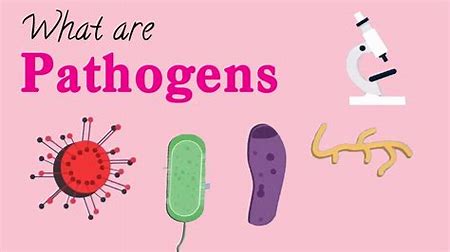How long does it take to know that we've been having symptoms of COVID-19?
After exposure to the virus, symptoms could have shown up as soon as two days to as long as 14 days later. The average incubation period is five days. The “incubation period” refers to the time between catching the virus and beginning to have symptoms of the illness.
What's one thing that can also help fight off cancer cells?
White Blood Cells!
5 Natural Ways To Boost Your Immune System
01. Probiotics
02. Vitamins
03. Mushrooms
04. Tea
05. Exercise
What can you do to boost your immune system?
Some parasites evade host immune defenses by acquiring an outer coat of host proteins.
Define A Pathogen

Pathogen > a bacterium, virus, or other microorganism that can cause disease.
Why can't hand sanitizer kill COVID-19?
Hand sanitizer doesn’t kill coronavirus because it’s antibacterial, not antiviral. Hand sanitizer (with at least 60% alcohol content) does kill the coronavirus. The alcohol disrupts RNA molecules in the virus, preventing it from making copies of itself.
What are lymphocytes made from?
Lymphocytes are made by the red bone marrow.
When was the first case of COVID-19 reported?
The novel coronavirus (COVID-19) was first reported in Wuhan, China, on Dec. 31, 2019.
For everyone that tests positive for COVID-19, they all pass away fatally from it.
False, of course not. Everyone has a different immune system and our systems are all built differently depending on how we take care of ourselves. COVID-19 might affect certain ages but if you're well enough, you're well enough to cope with COVID-19. Logically speaking many people who have been tested positive for COVID-19 have recovered due to their strong immune systems compared to weaker immune systems.
What is the fluid found in the lymphatic system? 
It's a Lymph!
What is one symptom of COVID-19?
A loss of smell or taste may be a symptom of COVID-19 but, obviously, research is still going on and the predominant symptoms remain fever, cough and shortness of breath.
Is it possible to make your immune system depressed?
What age groups can COVID-19 affect?
People of all ages can be infected by the new coronavirus (2019-nCoV). Older people, and people with pre-existing medical conditions (such as asthma, diabetes, heart disease) appear to be more vulnerable to becoming severely ill with the virus.
A person's body cannot always protect themselves from diseases and infections.
This is very true. This can be known as immunodeficiency which occurs when there's a missing or absent component needed.
What's is known to be our resistance to a certain pathrogen?
Why can COVID-19 spread so quickly?
A National Institutes of Health study suggests that the coronavirus may live on surfaces for a few hours and up to several days. How long the coronavirus can survive depends on the type of surface, temperature and humidity of the environment.
Does your immune system destroy a cell everyday?
What weakens our immune system?
01. Stress
02. Not Moving Enough
03. Unhealthy Food Such as Fast Food
04. Smoking
05. Drinking
+ Many more factors
There are 4 main parts of the our immune system.
False. The immune system is made up of various organs, tissues and cells that work together to protect the body against bacteria and foreign organisms. It acts as a barrier against invaders, attacking the organisms that try to reach within the body and cause a disease.
Identify!
A solution containing a harmless version of a virus, bacterium or toxin that causes an immune response when introduced into the body.
Did you say it's a vaccine?
You are correct!
What is the best solution or equipment to use when known for being positive for COVID-19?
Using a CPAP machine with COVID-19 patients may spread the coronavirus through the air. A ventilator works better than CPAPs or other devices, because ventilators don’t spew infectious particles. Also called invasive ventilation, a ventilator pushes air in and out of the lungs through tubes inserted down a patient’s airway.
What's our immune system's first in line defense?
It's our skin!
What are some foods that boost your immune system?
Turmeric, ginger, garlic, almonds, spinach, sunflower seeds ,broccoli. It doesn't only have to be food but vitamin intake as well.
One infected person infects 2.5 people.
It is true. The current estimate is that one infected person infects about 2.5 others, they in turn infect 2.5 others each. Then rapidly, one person results in 10 cases in the communities and that continues. To add on, even estimates suggest that if 100 people become infected, five will need to be hospitalized.
Define Immune System!
Immune System > The immune system is a system that fights off invading pathogens. Also, known as a defense system.